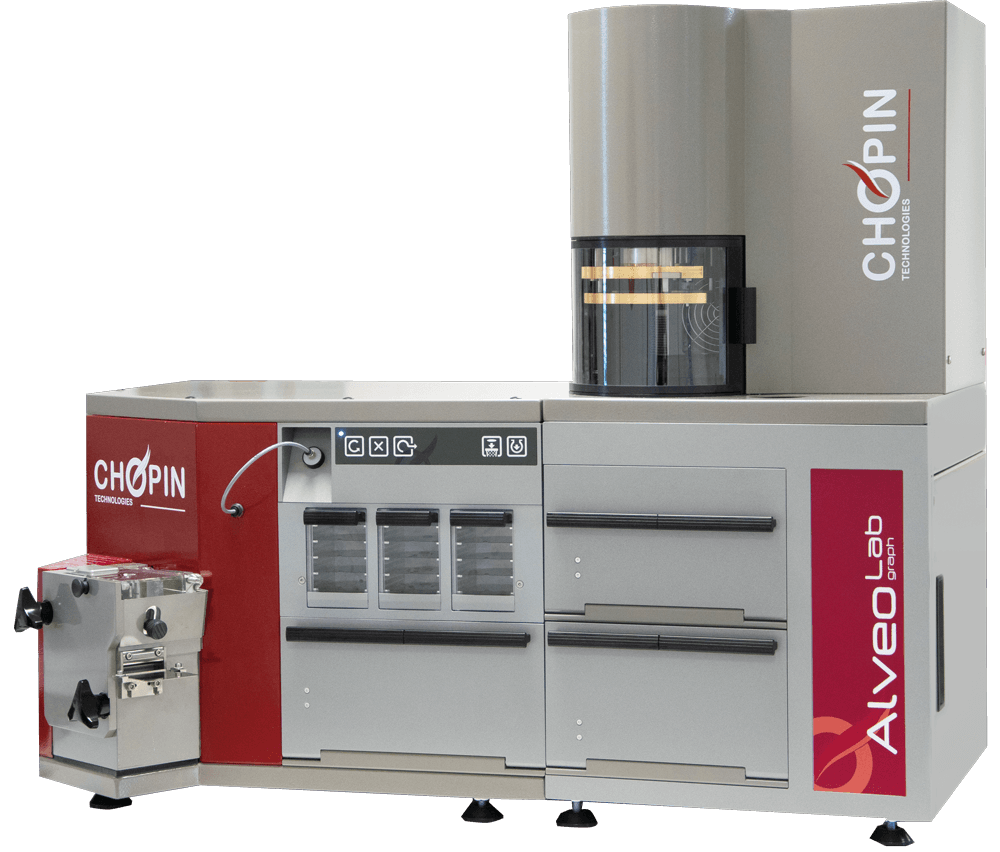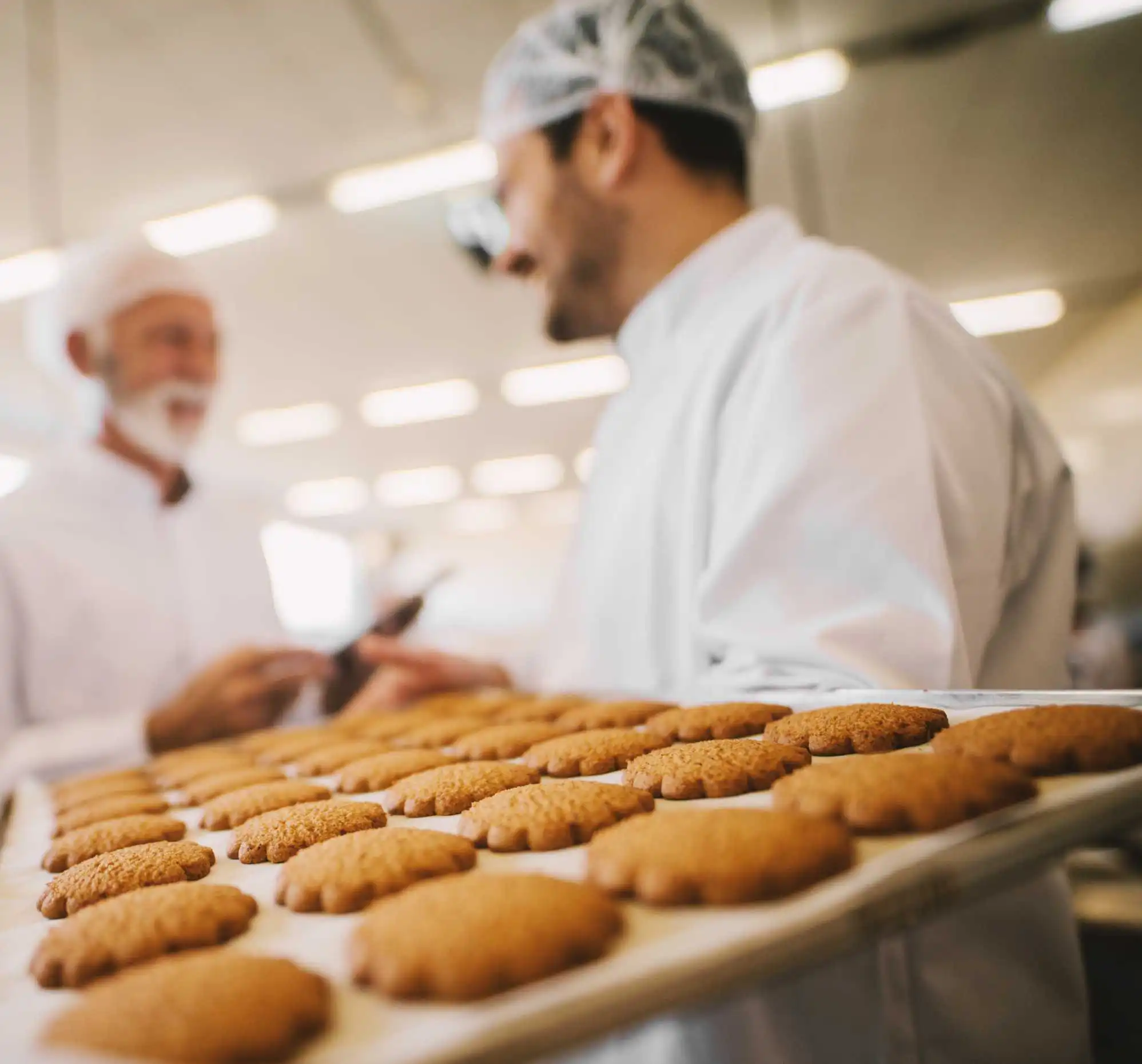
The CHOPIN Technologies Alveograph® Series is the industry-standard tool used to measure rheological properties of dough, such as tenacity, extensibility, elasticity, and baking strength. With this data, millers and bakers can predict the performance of flours used for baked goods, noodles, biscuits, etc.
For millers, the Alveograph® Series allows them to analyze and optimize blends of wheat and flour, or adapt them as needed for their customer. For bakers, the analysis data allows them to monitor incoming ingredients, test new recipes, control their production processes, and ensure high-quality final products.
Read how the CHOPIN Alveograph® products are being used in the industry:
National Center for Biotechnology Information: https://www.ncbi.nlm.nih.gov/pmc/?term=alveolab
Google Scholar: https://scholar.google.com/scholar?hl=en&as_sdt=0%2C5&q=alveograph+chopin&btnG=
Unlock the Secrets to Producing Superior Baked Goods
Benefits
- Understand dough behavior to ensure consistency in appearance, size, aroma, and structure.
- Monitor incoming wheat or flour to ensure you are starting with high-quality ingredients
- Improve efficiency by conducting multiple tests throughout the day
- Acts as a reference measurement for grains and cereals, both for quality control and developing new products
- Measure and adapt flour according to specifications
- Use proven, industry-standard analysis for your testing procedures
Features
- Provides universally recognized measurements for the main rheological properties – tenacity, extensibility, elasticity, and baking strength
- New whole wheat test protocol (Alveolab® only)
- Customizable protocols (Alveolab® only)
- Can be used for both hard and soft wheat
- Control testing temperatures automatically with theAlveolab® or with an external chiller for the AlveoPC
- Easy to use – simple, modern and intuitive interface
- Standardized analysis – meets AACC 54-30, ICC 121, NF EN-ISO 27971, and GOST 51415-99 standards
- Standardized data export for integration into a LIMS
Applications
Internationally Recognized As The Industry Standard Reference for Grains & Cereals
The Alveograph® Series is used by millers and bakers all over the world to provide test results that serve as reference for grains and cereals. Applications for the Alveograph® include analysis of:
- Wheat selection for baked goods or pasta
- Wheat or flour blends
- Vital gluten
- Salt and sugar impacts
- Durum wheat
- Additives and ingredients (proteases, amylases, deactivated yeasts, etc.)
- Insect contaminated wheat












Lineup

Alveolab® - Automated and Fully Controlled Testing
- Temperature and hygrometry control
- More data from a single test
- Software displays comprehensive test data
- All data is backed up to ensure perfect traceability
- Additional protocols and standards, including NEW whole wheat flour test protocol and adapted hydration test*
- Intuitive and complete software including a blending law tool and assistance to select the most suitable additive to obtain target values
* Optional Alveo-AH kit required

AlveoPC - For Use in Controlled Lab Environments
- Smaller, cost-effective benchtop analyzer
- Includes a mini-PC for data collection
- Comprehensive test data
- All data is backed up to ensure perfect traceability
Product Lineup
How It Works
Innovative & Efficient Functions Adapted for Many Protocols
The Alveograph analyzers are the industry standard tools used to measure rheological properties of dough. Rheological properties of dough indicate how it will perform in the production process, which includes:
- Machinability,
- Stickiness,
- Ability to keep its shape, whether it will spread or shrink,
- How it will develop during fermentation.
The Alveograph® Data is Used to Understand Dough Properties
- Tenacity – ability of the dough to resist deformation when being stretched
- Elasticity – ability of dough to spring back when it is stretched
- Extensibility – ability to stretch without breaking
- Baking Strength – global energy necessary to deform the dough into a bubble until rupture
The Test Involves Four Main Steps
The Alveograph® test is conducted by first producing a test piece of dough, and then injecting air into a thin patty of that dough to form a bubble, simulating gas (carbon dioxide) release and retention during dough fermentation and baking.
- Mixing flour and salted water
- Preparing five calibrated pieces of dough
- Putting these pieces of dough to rest
- Automatically inflating each piece of dough until the resulting bubble bursts

No need to wait until the end of the test to prepare a new one:as soon as the mixing bowl is free, you can start the next test.

System Components
Measurements
Characteristic Curve and Measurements
P: Tenacity (capacity to resist deformation)
Tenacity depends on water absorption capacity:
- Protein quantity and quality
- Starch damage
- Fibers (pentosans, ash content)
For a given hydration, tenacity represents the dough consistency (how hard a dough is)
L: Extensibility (maximum volume of air the bubble can contain)
Extensibility depends on:
- Protein quantity and quality (mainly)
- Extensibility represents the dough potential to stretch to hold gas (gas retention capacity)
Ie: Elasticity index, le = P200/P (P200: pressure at 4 cm from the beginning of the curve)
- Elasticity represents the capacity of a dough to stretch and return to its initial position when stress ends
- It is measured 40 mm after the beginning of the curve (L = 40)
- At this instant, the quantity of air injected in the bubble is 200 ml.
- The bubble volume at this instant indicates the dough resistance to deformation. It is a way to evaluate the elasticity.
W: Dough Baking Strength (area under the curve) or Energy Value
Baking strength depends on:
- Protein quantity and quality
- Starch damage
- Enzymes
- Interactions
P/L: Curve configuration ratio of tenacity and extensibility
International Reference
- Water absorption (WA), tenacity (P), extensibility (L), elasticity (I.e.), baking strength (W)
- ISO 27971, AACC54-30.02, ICC 121, GOST 51415-99

Software

The Alveograph Series software provides straightforward, comprehensive, and intuitive data. Information about tenacity, extensibility, elasticity, and baking strength allow the lab technician to make decisions about blends or additives. A standard analysis certificate is automatically generated for use in verifying the test results.
The Alveograph Series software provides straightforward, comprehensive, and intuitive data. Information about tenacity, extensibility, elasticity, and baking strength allow the lab technician to make decisions about blends or additives. A standard analysis certificate is automatically generated for use in verifying the test results.
Accessories
Accessories to Streamline Testing
The Alveograph® includes several helpful accessories to make testing easier and faster for users:
- Semi-automatic cutter for consistent patty size samples, and ease of processing
- TeflonTM -coated resting plates to avoid sticky residue and easy cleaning
- Reference flours to ensure accurate testing (optional)
- Dedicated CPU (MiniPC) running under Windows 10 IOT



Specifications
Frequently Asked Questions
Resources






















